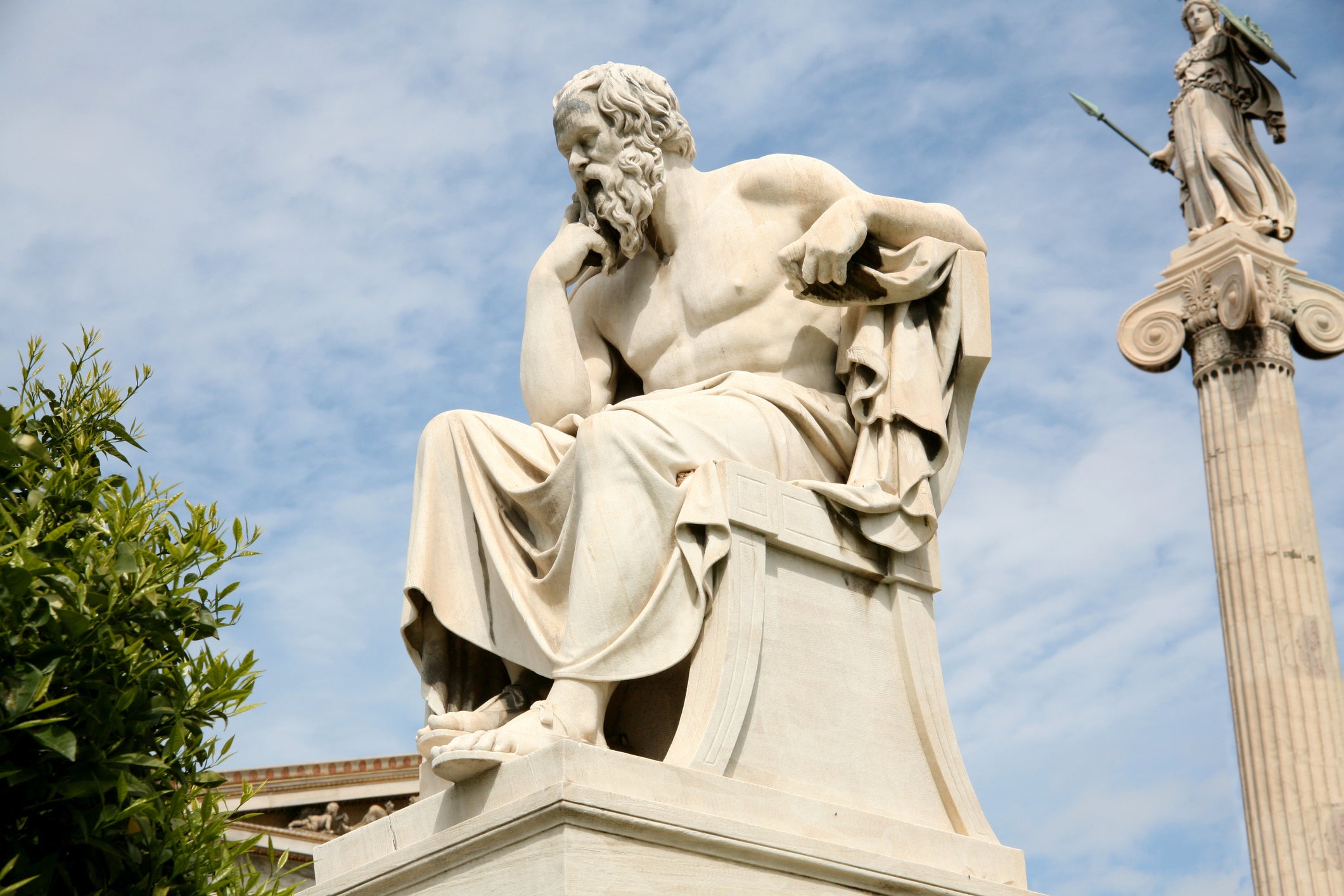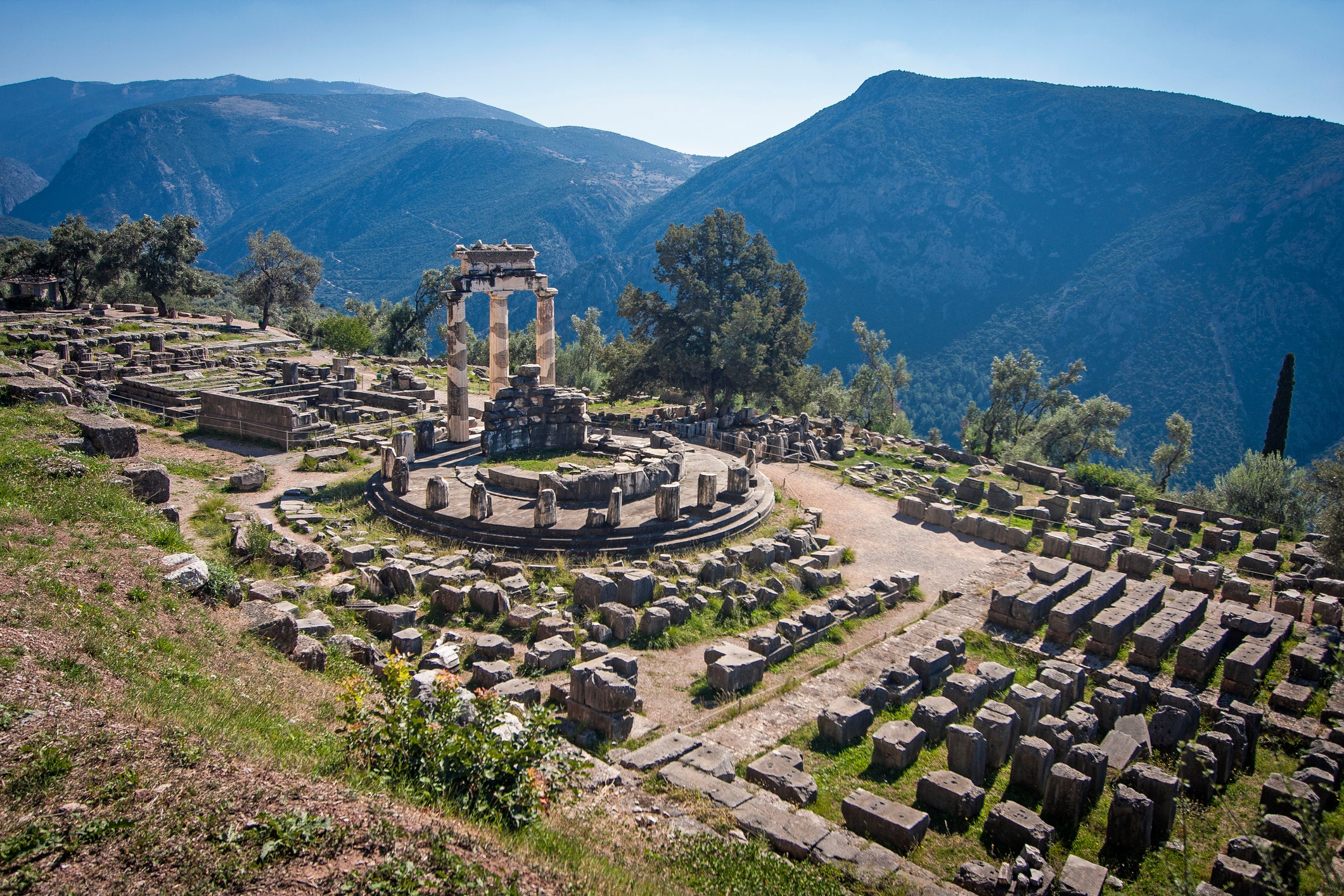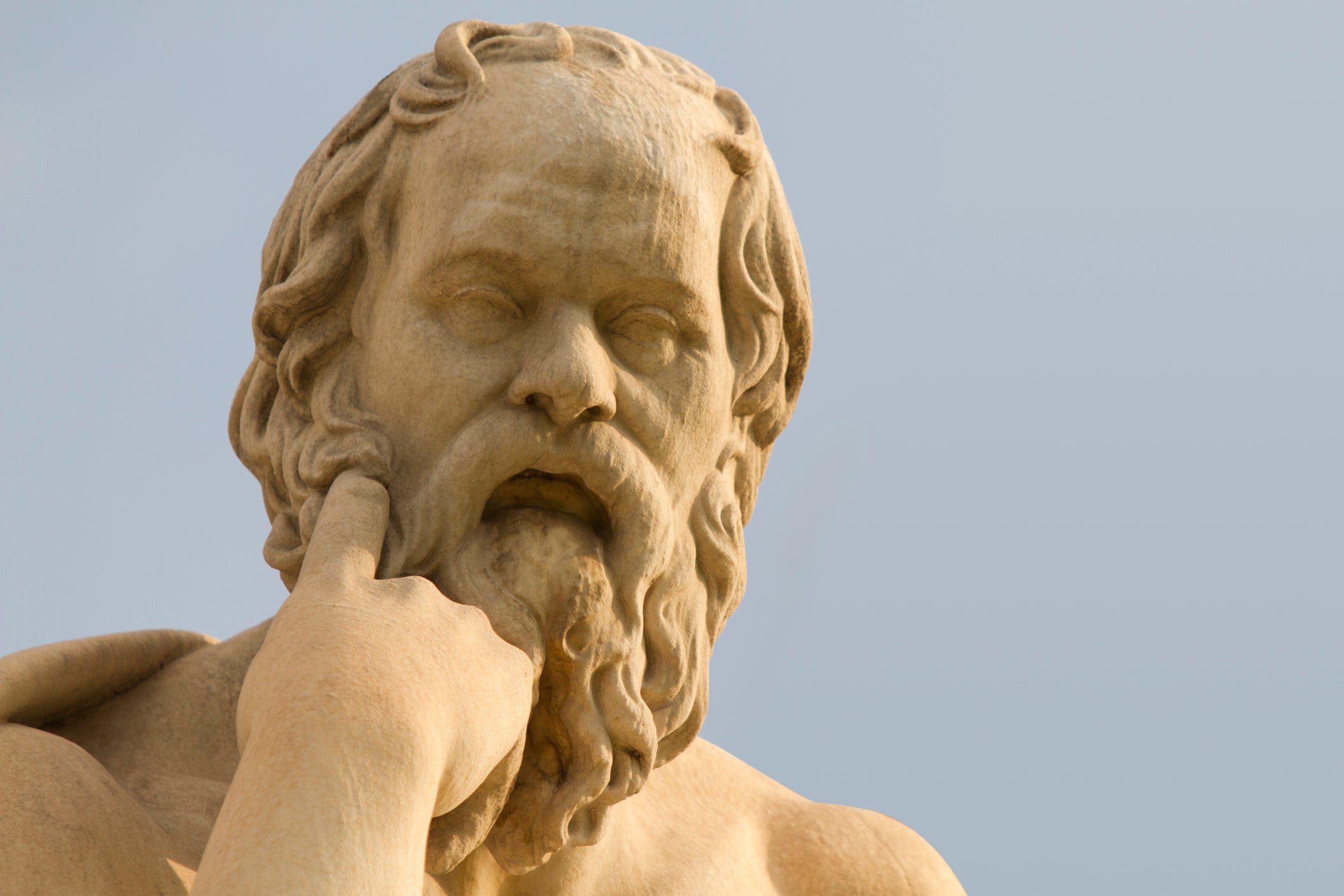Socrates was concerned with this life and how best to live it
Our series continues with a man who changed the course of philosophical thinking. We do not know exactly what Socrates himself believed but his influence was deep and lasting

It would be difficult to overestimate the influence of Socrates (470–399BC) on western philosophy. We know that he was the mentor of the young Plato, and we also know that Plato’s writings had deep and lasting effects on virtually the whole of western thinking.
However, it would also be difficult to overestimate our ignorance of Socrates’ actual views. Socrates probably wrote next to nothing of a philosophical nature, and, anyway, none of it survives. Our problem, the “Socratic Problem” as it is called, is that we do not know exactly what Socrates himself believed – it is not clear that he claims to know anything. He even denies being a teacher. So we know he is massively influential, but we do not know the precise nature of that influence. The situation is more than exasperating.
Socrates is believed to have been the son of a midwife and a stone mason. Although he was reduced to poverty in old age, he seems to have enjoyed a reasonably well-off early life. He served as a hoplite (a heavy infantryman) in the Athenian army, so at least at that time in his life he must have owned property and been able to pay for his own equipment. However he made his living, it was not by his looks. He is described variously as pug-nosed, thick-lipped and rotund. His eyes, though quick, were bulbous, and he seems not to have been devoted to personal grooming. His ability to drink was prodigious and well known.
If what interests us is not his life but his views, then there are only three reasonable sources of information about Socrates’ philosophy, three writers alive in his lifetime. The comic poet Aristophanes is one, but he paints a ridiculous portrait of Socrates, a general caricature and amalgam of philosophers and intellectuals active in Athens at the time. The writings of Xenophon survive, but he characterises Socrates as nothing more than a vapid repository of homey aphorisms – one wonders how such a man could have troubled the Athenian authorities as much as Socrates, in fact, did.
We have, finally, the dialogues of Plato, but even these are problematic. We will follow convention and assume with most commentators (and with a large pinch of salt) that the Socrates of the early dialogues is as near a faithful representation of the views of the actual Socrates as we are likely to have.
A new approach
In other words, it may be that Socrates finds value not in getting at the truth but looking for it in conversation
From those early dialogues, something of the man’s views emerges. It is clear that we call those who came before Socrates “Pre-Socratic” for a reason: his interests differ markedly from the preoccupations of Parmenides, Heraclitus, Anaximander and the like. Rather than speculate on cosmology, affecting dark pronouncements on the nature of the Absolute, Socrates was “the first to call philosophy down from the heavens”, in Cicero’s memorable phrase. Socrates worries about this life and how best to live it. His concerns are resolutely practical.
The early dialogues
The Socrates of the early dialogues typically strikes up a conversation with one or a few interlocutors, which eventuates in a question about the nature of some virtue or other: what is justice, what is piety, what is courage or what is temperance. The interlocutor attempts an answer. Socrates then subjects the answer to critical analysis, usually showing that the answer is inconsistent with something else held by the interlocutor to be true, that it leads to some confusion or other or is plainly lacking in some respect. The Greek word for this pattern of questioning, responding and scrutinising is elenchus, and Socrates was a master of it. According to Xenophon, he “could do what he liked with any disputant”. Why did he engage in elenchus? There are a number of answers.
According to one legend, Chaerephon asks the Oracle at Delphi whether anyone is wiser than Socrates, and the surprising answer is that no one is wiser. Socrates, astonished, tries to prove the Oracle wrong by approaching those who profess wisdom and asking them about the virtues. When he reduces each one to confusion, he concludes that the Oracle is right, in a way: Socrates knows he doesn’t know anything, whereas others are wrong in thinking they know.

The point of the many encounters, the many arguments, cannot just consist in undermining the self-confidence of prominent Athenians. Indeed, we have some hints from the dialogues of Socrates’ own view of his activity. Perhaps Socrates really is pursuing definitions. It certainly seems, in places, as though he thinks that only with such definitions in hand can one have the knowledge required to make the right choices in life. Unless we know what justice is, how can we possibly hope to act justly?
We do have the problem of reconciling the fact that Socrates never clearly settles upon a definition, yet he does not consider his efforts failures. The dialogues do not end with a crestfallen Socrates, head in hands, bemoaning his ineptitude. On the contrary, there is often a kind of upbeat satisfaction, even gratitude shown all around to those who have taken the time to reflect with him, something approaching joy and the recognition of time very well spent. Engaging in the co-operative pursuit of definitions is not only of value to him, it is of extraordinary value: the unexamined life, Socrates says as he nears his death, is not worth living. Yet if the aim of the exercise is getting definitions, the examined life is a kind of failure. There is at least one way to resolve this depressing conclusion.
It might well be that a stable definition is not the point and purpose of the exercise at all; perhaps the activity of joint enquiry itself is the aim, and that examination itself is of value. In other words, it may be that Socrates finds value not in getting at the truth, but looking for it in conversation. One might reasonably wonder why he thinks this. Some maintain that instilling in his companions not truth, but the desire for truth, was the point in the first place. It is worth noting that philosophy as it is conducted now still has a share in this. Lectures at university are accompanied by seminars aimed at discussion. Talks at conferences are followed by questions and answers. Philosophy is still the collective enterprise it was in Socrates’ day. Perhaps this is a kind of vindication of this view of his activities.

Socratic paradoxes
Although no clear and stable definitions materialise, there are some themes, if certainly not doctrines, that emerge in the early dialogues which we might reasonably take to be Socratic. There are many formulations of the co-called “Socratic paradox” or “Socratic paradoxes”: No one does wrong voluntarily or deliberately; virtue is knowledge; moral weakness is impossible. The line of thought underpinning all versions is this: What is good is beneficial and what is evil or wrong is harmful to us. Doing wrong hurts us, and damages what is most valuable in us – our soul. No one really desires what is harmful unless they fail to recognise it as such, unless they mistake it for something beneficial. All wrongdoing, then, results from ignorance. No one who really knows virtue will act immorally; no one who really understands right and wrong will choose anything other than what is right. Anyone who chooses to do something morally wrong does so only in ignorance.
Would this view have been a comfort to Socrates who, at the age of 70, faced his accusers on charges of impiety and corrupting the youth of Athens? It is hard not to wonder. But we can do more than wonder about the charges. Socrates professed to have a kind of mystical, divine sign – perhaps something like an inner voice – which warned him against some actions. The Delphic Oracle’s pronouncements might have been taken by him as a kind of holy mission. Both of these possibilities might explain a part of the impiety claim. In what sense did he corrupt the youth? As you might imagine, speculation has abounded. He certainly did gather around him a circle of young men, many the sons of prominent Athenians, quite of few of them staunch anti-democrats. When democratic feeling ran high, it is possible that excuses for the boys’ unpopular views were found in the influence of Socrates.
If we cannot say, exactly, what doctrines Socrates held or how he lived, we know at least from the dialogues that Plato loved him, whoever he was
We can also do more than wonder about the motivations of his accusers. Certainly his practice of asking prominent Athenians awkward questions, in broad daylight and in public, about the nature of virtue, reducing them to confusion and suffusing his interrogations with well-known Socratic irony, could not have won him many influential friends. It is likely that the intention of his accusers consisted in little more than shutting him up.
In Plato’s record of the trial, it is clear that if only Socrates would agree to stop his philosophising, he would be free to go, but this is, of course, the one thing he simply cannot do. When given the chance to plead for his life, to recommend a punishment for himself other than death, Socrates offers his judges an ethics primer. He suggests that his good works – his interrogations, which have done nothing but improve the moral health of the citizens and therefore the city of Athens – can only be rewarded by putting him up at the expense of the city itself in his declining years. He seems to have left his judges with no alternative but to condemn him to death. He refuses the opportunity to flee. He drinks the poison and dies.
If we cannot say, exactly, what doctrines Socrates held or how he lived, we know at least from the dialogues that Plato loved him, whoever he was. The portrait he paints is profoundly affectionate. Socrates might have been physically unappealing, but it is hard to imagine a more attractive character: the good humour and conviviality; the devastating skill in debate; the passion for knowledge or at least the will to pursue it anywhere and anytime; patience with those keen to know and little time for fools; the oddness; the integrity which cost him his life.
It is easy to be drawn into the debate, to smile and quietly cheer for Socrates as he brings low some over-stuffed, jet-setting Athenian; to read again difficult parts of his replies in the hope of better understanding him; to put the book down and stare out a bus window, wondering what Socrates would have said had so-and-so replied to his question a little differently. You can easily understand what good company he must have been. Had you been there – sitting in the Athenian sun, listening to the arguments – you would have been corrupted too. No doubt this has much to do with Plato’s art, but it is impossible not to suppose, too, that it has something to do with the personality of Socrates.
Major works
Socrates wrote nothing of a philosophical nature. We can, however, look to Plato’s early dialogues – which some take to express Socrates’ actual views – for guidance. The following three dialogues together give an account of part of Socrates’ philosophy and the way he faced his death. We cannot say just when any were written.
Apology contains Socrates’ defence in response to charges of corrupting the youth of Athens and impiety. He also talks about his beliefs and convictions and the life he has led.
Crito recounts a conversation between Socrates and his friend Crito, which conveys something of Socrates’ ethical views.
Phaedo is a very moving account of Socrates’s final hours and contains discussions of immortality, the soul, and death.
Join our commenting forum
Join thought-provoking conversations, follow other Independent readers and see their replies
Comments
Bookmark popover
Removed from bookmarks